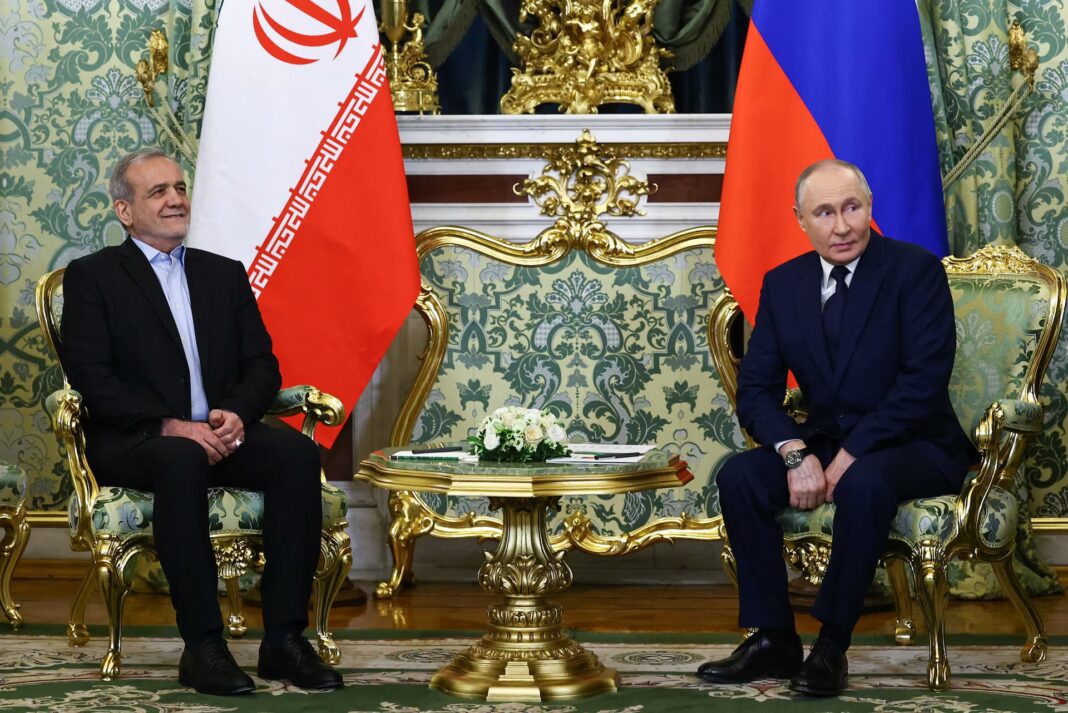Russian President Vladimir Putin and Iranian President Masoud Pezeshkian met in Moscow on Friday to finalise a comprehensive strategic partnership treaty. The agreement aims to deepen defense, economic, and energy cooperation between the two nations, signalling a further strengthening of ties amid shared tensions with the West.
Long-Awaited Treaty
Putin welcomed Pezeshkian in an elaborate ceremony at the Kremlin. Both leaders expressed optimism about their collaboration, emphasizing the completion of a long-discussed agreement. The treaty, spanning 20 years, focuses on enhancing bilateral relations but stops short of including a mutual defense clause. This differentiates it from similar agreements Moscow holds with Belarus and North Korea.
While Russia and Iran insist their partnership is not directed against other countries, Western nations are likely to view the treaty with suspicion. Both nations are frequently criticised for their roles in global conflicts and for challenging U.S. influence.
Expanding Defense Cooperation
Defense cooperation remains a cornerstone of the Russia-Iran partnership. Russia has reportedly relied heavily on Iranian drones in its conflict with Ukraine. Though Tehran denies supplying drones or missiles, U.S. officials allege otherwise.
Moscow has previously provided Iran with advanced S-300 air defense systems, and Iranian media reports suggest interest in procuring the more advanced S-400 systems. Discussions on expanding this cooperation, possibly including advanced fighter jets, could be part of the new treaty.
Energy and Nuclear Collaboration
The energy sector plays a critical role in the partnership. Iran’s oil minister accompanied Pezeshkian on his Moscow visit, with discussions expected to address navigating Western sanctions. Both nations have faced significant restrictions, pushing them to explore alternative trade mechanisms.
Russia has already built Iran’s first nuclear power plant at Bushehr, operational since 2013. Additional contracts for two more reactors were signed in 2014. This visit included talks about advancing nuclear energy projects, underscoring Moscow’s continued involvement in Iran’s energy sector.
Shifting Influence in the Middle East
Iran’s growing ties with Russia come as its regional influence faces challenges. The recent ousting of Bashar al-Assad in Syria and military setbacks for Iran-backed groups like Hezbollah and Hamas have reduced Tehran’s dominance in the Middle East.
Russia, too, finds its position in Syria uncertain. With two critical military bases in the region, Moscow is keen to maintain its strategic foothold despite the ongoing political changes. These shifts highlight the urgency for both nations to bolster their partnership.
Broader Areas of Collaboration
In addition to defense and energy, the treaty aims to expand cooperation in transportation, education, tourism, and culture. Russian Prime Minister Mikhail Mishustin emphasized these areas during talks with Pezeshkian. Both countries see cultural and economic exchanges as a means to strengthen their long-term relationship.
Geopolitical Implications
The treaty reflects a shared strategy to counter Western influence. Both Russia and Iran have been heavily sanctioned, pushing them to seek alliances that bypass traditional financial and trade systems. Their growing cooperation raises questions about how the West will respond to this evolving geopolitical alignment.
Future Outlook: A Balancing Act
As Russia and Iran deepen their ties, both nations must carefully navigate a complex global landscape. For Russia, maintaining relationships with Iran and other non-Western allies helps counterbalance isolation from Western sanctions. For Iran, the partnership offers vital economic and defense opportunities amid mounting regional and international pressures.
But both countries risk further alienation from global powers opposed to their policies. The success of this strategic partnership will depend on how well they balance their shared ambitions with the challenges of an increasingly divided world.
The Russia-Iran strategic partnership treaty represents a significant step in their alliance. By expanding cooperation across critical sectors, the two nations are solidifying their roles as influential players in a multipolar world. However, their deepening ties are likely to heighten tensions with Western powers and reshape dynamics in the Middle East and beyond.

